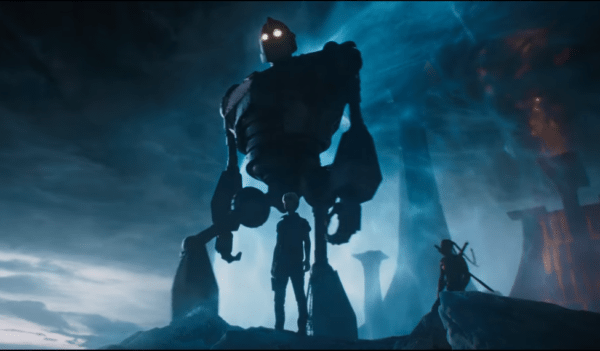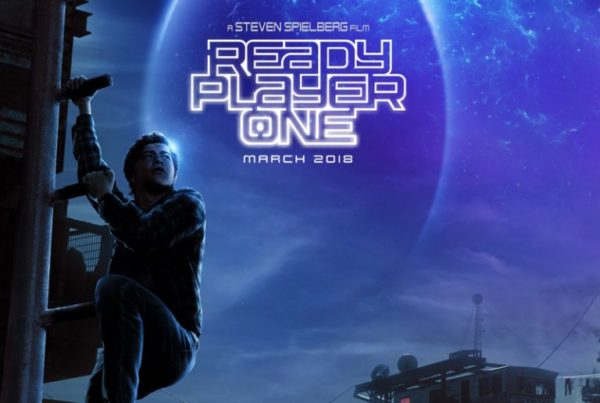Anghus Houvouras on Ready Player One…
Ready Player One. Ernest Cline’s huge hit of a novel came out in 2011 and was embraced by the geek community like few other novels in the 21st century. It was a highly coveted book even before it’s release when publishers engaged in a bidding war for the rights. It was an immediate best-seller and the movie rights were quickly acquired with Spielberg attached to direct. There was a brief period where the book, referred to as ‘The Pop Culture Bible’ felt like it had achieved a special place in geek culture.
The recent trailer for the cinematic adaptation has stirred the social media pot and there are a lot of less-than-stellar opinions about Cline’s novel and the prospects of the finished film. Like anything hugely popular, there will be strong opinions on both sides. I’ve spent some time thinking about the novel, the movie and why the geek community seems predisposed to recoil at Ready Player One.
There are obviously fans of Ready Player One and Ernest Cline. He was able to successfully tell a story using nostalgia as a foundation. I always found the idea of ‘The Stacks’ aka the homes stacked atop one another as a metaphor for how Cline told this story. He used the influences and cultural staples of an era and started stacking a story on top into perilously arranged towers that felt like they could topple over at any minute. Here’s a site that compiled every piece of reference from the novel. It’s mind-blowing when you see it all in one place.
Then after finishing the book you realize that not only the foundation for Ready Player One is built from nostalgia, but the frame, the bricks and the mortar as well. It’s a story that couldn’t exist without a tsunami of references. It’s a story built from easter eggs. In 2011 that felt obvious, but quaint. The idea of constructing a narrative from nostalgia is happening more often. People are beginning to see through the paper-thin walls and the crumbling foundation of stories that not only take inspiration from the past but grind it into a fine powder, mix it with a simple concept and use it to build their borrowed world.
Stranger Things is an example of constructing a narrative from nostalgia. The show is a melange of 80’s movies, books, television, styles and references. The show couldn’t exist without nostalgia. If you stripped away the references and the pop culture elements used as story elements, you’d end up with something far less watchable.
Ready Player One is even more vulnerable. If you took away the pop culture references, you wouldn’t have a book. Cline co-opted so many elements to create the future of 2044 and The Oasis that the story literally couldn’t exist without the nostalgic elements. It’s a world made up of other worlds. The movie exposes this problem in an even more glaring way.
And I know you’re saying “But we haven’t seen the movie yet”. You’re right, we haven’t. But we’ve seen the trailer. That cringe-inducing, reference reliant piece of marketing that exposes the problem with using nostalgia as a narrative. The Ready Player One trailer feels like the reverse engineered patient zero of nostalgia product. It almost automatically feels disingenuous. That last bit with the Back to the Future theme says it all: ‘This is a movie made from pre-assembled parts’
The book says the same thing, but more slowly. That fact isn’t jackhammered into your eyes and ears over two minutes. The book has references some people might not get. I love They Might Be Giants, but I’m guessing that those words don’t immediately pop music into your brain. Film is a different medium (duh) where the visuals, audio and music are composed to create a singular experience. While Cline is throwing a reference at your every page or two, Spielberg isn’t afforded the breathing room, especially when condensing it all into a trailer where you’re forced to see how much nostalgia is crammed into every frame.
And I think that’s why people are reacting negatively towards the movie. It doesn’t feel organic. It feels like nostalgic product and the trailer overwhelms us with how heavily the story relies on the past. The Ready Player One movie is the embodiment of this nostalgic age of cinema. It’s too on-the-nose. A reference heavy movie directed by a guy who helped influence the references used in the movie. It’s like some kind of pop culture perfect storm scenario. One of the Gods of cinema has been handed a world he helped create. It feels like someone making the movie version of their own life story. There’s something that feels off about the pairing.
At least the book had the element of relying on the readers’ imagination to connect the references to build this world. When those same story elements are assembled and created for film, it feels far less novel. Your imagination is removed from the equation and instead of getting a box of LEGOs to put together you’re given a preassembled final product to judge. The book gives different readers a different experience. Variations based on how many of the pop culture references the reader understands. In the movie, there’s only one variation: Spielberg’s.
The backlash comes from taking a reference reliant narrative and putting it on-screen where our imaginations are removed from the equation.
Summary of points:
1. Narratives constructed from nostalgia are becoming far more common than they were in 2011 when the book was released
2. The movie exposes how reliant the story is on pop culture references
3. The movie removes imagination from the equation leaving us with cut-and-dry interpretations which diminishes the storytelling experience
Anghus Houvouras















